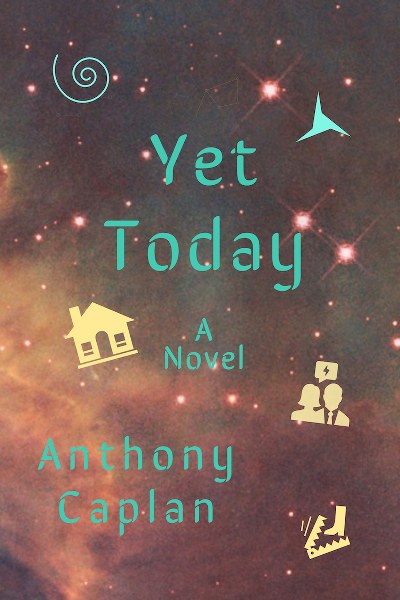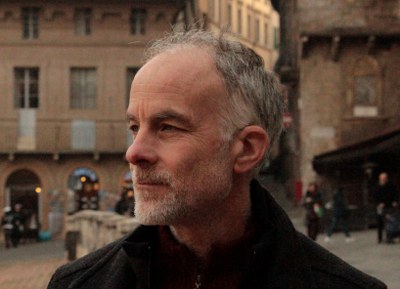Yet Today
by Anthony Caplan
Genre: Contemporary Family Thriller
School's out for summer, and that's when Gillum Kaosky heads for the exits. Poised somewhere between neediness and nothingness, Kaosky sets out for summer adventures.
Gillum is a Spanish teacher. He's been married for twenty years and has three children with his wife Sibyl. They have raised their family on a farm in central New Hampshire. But this summer, Gillum lands a job that will change everything: wire-tapping the Dominican crime families responsible for bringing heroin and fentanyl into northern New England. Meanwhile, his son, Jonah breaks into the Department of Defense in a hack attempt that lands him in jail. Nothing remains the same, and love does not always conquer all in Yet Today, a thrilling, contemporary family saga from Anthony Caplan.
Outside, on the streets of the town, there was an odd calm, as if the
panic he felt were truly an illusion. The rest of creation seemed to be
awaiting the further development of nothing extraordinary. He stopped
at a traffic light and checked the faces of the oncoming motorists. They
seemed astonishingly ugly in their cheap, mirrored sunglasses, their
cheesy grimaces protecting against the glaring noonday sun. Out on the
ruined strip, with its line of closed, boarded up storefronts, was a
Dollar Store and several ancient fast food restaurants. On the corner
was the multilevel furniture outlet blaring deals in some ballooning
white lettering from its glassed front. It had been there forever,
surviving downturns and boom times with an equanimous allegiance to the
balloon font, attracting shoppers from as far afield as Quebec and New
York State with its specials on Chinese futons and designer mattresses.
The yearning for a good night’s sleep was apparently a constant through
thick and thin. Next to it was a new vape shop with the logo of an
aquamarine unicorn that already seemed tawdry and dated, as if that was
part of the appeal. He parked in the lot next to the vape shop. The
clientele here had moved beyond yearning for sleep to hankering after
the deep six. It seemed to Kaosky a logical if somewhat depressing
progression. Next down was the New Hampshire Liquor and Wine outlet. Out
the door of the vape shop stepped a young woman with thin arms and an
illegible tattoo sprawling across one shoulder, barely covered by a thin
spaghetti strap. Her pelvic bones
extended above her jeans. They avoided eye contact, but her tilting step caught Kaosky by surprise, as he tried and failed to evade her.
“Excuse me,” he said.
“Jesus Lord. I’m sorry,” said the young woman in a raspy, high voice, like compressed air releasing from a leak.
“That’s okay,” said Kaosky.
“Wouldn’t have a fiver, would you?” she asked. Her head seemed to wobble for a second as if she was about to fall.
“No, I’m sorry. I don’t carry cash.”
“That’s not great.”
“Sorry.”
“You already said that. You think I didn’t hear you?”
“No. You heard me fine, I’m sure.”
Kaosky stepped by her on the sidewalk and checked himself mentally. He turned to the girl. She glared at him, but despite her anger there was something in her look, a weakness that seemed almost pure in its acceptance of infirmity. She wasn’t hiding her desperation and lack of recourse to anything beyond her words and sharp anger.
“You want something to eat?”
“Uh. Why?”
“Well, I’d go into the Burger King there and get you something.”
“That’s across the street. Why didn’t you park there?” She was disgusted by him.
“I would go there if you were interested. I’m sorry.”
“Holy shit, you really are a creep. I’m looking for some cigarettes. I’m sure you don’t smoke.”
“I used to.”
"You quit or something. Right? Nothing worse than a quitter.”
“It’s been a long time. What do you smoke?”
“Kools.”
She must have been no more than eighteen or nineteen despite the lines around her eyes and the sunken cheeks.
Kaosky picked out a six-pack of something called Jackman’s Victory Ale, a local craft beer with an alcoholic content of seven percent. At the checkout he asked for a carton of mentholated cigarettes. He looked to the sliding front door. Two older men walked in, both wearing Patriots ball caps, plaid flannel shirts and olive green Dickies despite the weather. He
thought he saw the girl, but he wasn’t sure. She could have gone already. But when he walked out there she was, waiting around the corner, leaning against one of three yellow steel bollards installed in front of the parking lot, some subliminal iteration of state power.
“I got you these,” he said, holding up the pack of cigarettes.
“Sweet,” she said, but stayed leaning against the bollard. Her frailty had a stink to it.
“But I got a question for you.”
“Anything you want, mister. That’s real nice of you.”
“I want you to do something with these. Not just smoke ‘em.”
“What else you going to do with cigarettes?” she asked teasingly, her curiosity piqued.
“I don’t know. Go home and talk to your family.”
“I don’t have family. My mother’s dead and my father’s some shithead I don’t even know. Last I heard he was in the VA hospital with stage four pancreatic cancer or something. Good riddance.”
“You’ve got a family. Grandparents. Cousins. Somebody who will take you in somewhere.”
She opened the carton, used her teeth to rip the cellophane off a pack and knocked it against the flat of her hand to dislodge the first one.
“You want a smoke?” She held out the pack with the protruding white tip invitingly.
“No, thanks,” said Kaosky, disgusted, waving it away.
In the car, he started the ignition and fiddled with the radio dial. His hands were shaking with the pent up nerves of what he’d done. He watched his hands with a sense of distance, as if they weren’t really his hands. He’d been acting the part of the philanthropist, buying the girl the carton of cigarettes and then setting her up with the promise of grandiose things. It was all such an absurd act, reading of lines from some ideal prompter. He had no idea from where the impulse had come to him. Since the day in the woods watching the children and Sibyl behind the trees, he’d fallen into a spell, watching his life, observing instead of doing, as if he’d taken a turn into another reality and he was stuck now watching from the old space, doing and feeling in ways that were incompatible with his former self, not able to stop. He should have taken a cigarette; he felt like he needed one now.
extended above her jeans. They avoided eye contact, but her tilting step caught Kaosky by surprise, as he tried and failed to evade her.
“Excuse me,” he said.
“Jesus Lord. I’m sorry,” said the young woman in a raspy, high voice, like compressed air releasing from a leak.
“That’s okay,” said Kaosky.
“Wouldn’t have a fiver, would you?” she asked. Her head seemed to wobble for a second as if she was about to fall.
“No, I’m sorry. I don’t carry cash.”
“That’s not great.”
“Sorry.”
“You already said that. You think I didn’t hear you?”
“No. You heard me fine, I’m sure.”
Kaosky stepped by her on the sidewalk and checked himself mentally. He turned to the girl. She glared at him, but despite her anger there was something in her look, a weakness that seemed almost pure in its acceptance of infirmity. She wasn’t hiding her desperation and lack of recourse to anything beyond her words and sharp anger.
“You want something to eat?”
“Uh. Why?”
“Well, I’d go into the Burger King there and get you something.”
“That’s across the street. Why didn’t you park there?” She was disgusted by him.
“I would go there if you were interested. I’m sorry.”
“Holy shit, you really are a creep. I’m looking for some cigarettes. I’m sure you don’t smoke.”
“I used to.”
"You quit or something. Right? Nothing worse than a quitter.”
“It’s been a long time. What do you smoke?”
“Kools.”
She must have been no more than eighteen or nineteen despite the lines around her eyes and the sunken cheeks.
Kaosky picked out a six-pack of something called Jackman’s Victory Ale, a local craft beer with an alcoholic content of seven percent. At the checkout he asked for a carton of mentholated cigarettes. He looked to the sliding front door. Two older men walked in, both wearing Patriots ball caps, plaid flannel shirts and olive green Dickies despite the weather. He
thought he saw the girl, but he wasn’t sure. She could have gone already. But when he walked out there she was, waiting around the corner, leaning against one of three yellow steel bollards installed in front of the parking lot, some subliminal iteration of state power.
“I got you these,” he said, holding up the pack of cigarettes.
“Sweet,” she said, but stayed leaning against the bollard. Her frailty had a stink to it.
“But I got a question for you.”
“Anything you want, mister. That’s real nice of you.”
“I want you to do something with these. Not just smoke ‘em.”
“What else you going to do with cigarettes?” she asked teasingly, her curiosity piqued.
“I don’t know. Go home and talk to your family.”
“I don’t have family. My mother’s dead and my father’s some shithead I don’t even know. Last I heard he was in the VA hospital with stage four pancreatic cancer or something. Good riddance.”
“You’ve got a family. Grandparents. Cousins. Somebody who will take you in somewhere.”
She opened the carton, used her teeth to rip the cellophane off a pack and knocked it against the flat of her hand to dislodge the first one.
“You want a smoke?” She held out the pack with the protruding white tip invitingly.
“No, thanks,” said Kaosky, disgusted, waving it away.
In the car, he started the ignition and fiddled with the radio dial. His hands were shaking with the pent up nerves of what he’d done. He watched his hands with a sense of distance, as if they weren’t really his hands. He’d been acting the part of the philanthropist, buying the girl the carton of cigarettes and then setting her up with the promise of grandiose things. It was all such an absurd act, reading of lines from some ideal prompter. He had no idea from where the impulse had come to him. Since the day in the woods watching the children and Sibyl behind the trees, he’d fallen into a spell, watching his life, observing instead of doing, as if he’d taken a turn into another reality and he was stuck now watching from the old space, doing and feeling in ways that were incompatible with his former self, not able to stop. He should have taken a cigarette; he felt like he needed one now.
Anthony Caplan is an independent writer, teacher and homesteader in northern New England. He has worked at various times as a shrimp fisherman, environmental activist, journalist, taxi-driver, builder, window-washer, and telemarketer, (the last for only a month, but one week he did win a four tape set of the greatest hits of George Jones for selling the most copies of Time-Life’s The Loggers.) Currently, Caplan is working on restoring a 150 year old farmstead where he and his family tend sheep and chickens, grow most of their own vegetables, and have started a small apple orchard from scratch His road novels, BIRDMAN and FRENCH POND ROAD, trace the meanderings of one Billy Kagan, a footloose soul striving after sanity and love in the last years of the last century. His latest fiction effort, LATITUDES – A Story of Coming Home, to be released on Kindle, Nook and Smashwords and paperback in the summer of 2012, is a young boy’s transformative journey overcoming dysfunction, dislocation and distance.
$50 Amazon
Follow the tour HERE for special content and a giveaway!








No comments:
Post a Comment